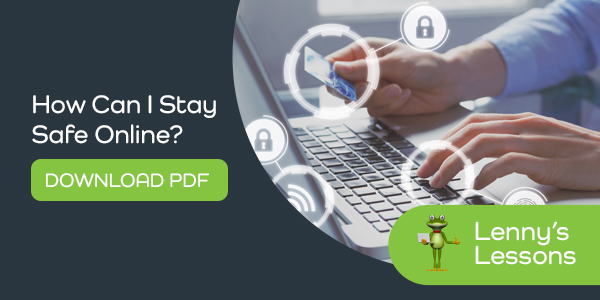The internet can be a dangerous place. Or at least, it can seem that way when you’re entrusting your details to an online retailer.
At times, buying a product on the internet can feel a bit like tiptoeing down a dark alley to meet a stranger who’s promised to sell you a genuine Rolex watch for $5.99! So, when you’re shopping online, how can you avoid getting mugged? (Financially speaking.)
Before you plonk all that hard-earned e-cash down onto your favourite retailer’s shiny electronic counter, it pays to make sure the folks you’re dealing with are legitimate. So always keep your wits about you!
Considerations
G’day! Lenny here, hopping back to give advice on a vital topic: “How to avoid getting fleeced!”
Online safety’s a cinch if you’re sensible and when you’re hopping across lily-pads, keep an eye out for imposters. Let me share some hard-won survival tips for that little lagoon called the internet!
Consideration #1 – If something doesn’t look right … it probably isn’t.
So, when you’re about to sign up for something, have a think whether it looks legit.
Obviously, most people are trustworthy. But equally, some aren’t.
That’s why we have logos, forms, electronic signatures, and the like.
For example, ask yourself: Would a Mastercard statement be riddled with spelling errors?
It’s … unlikely. So keep that in mind before taking the plunge.
Consideration #2 – Is your computer warning you?
Sometimes, it actually pays to listen to your computer. You know those annoying warnings that can flash up when clicking on a site? When your computer smells a water rat, it might well be onto something.
So, just as you wouldn’t ignore your car’s oil light, it’s a good idea to pay attention. If your virus checker’s spitting chips, it’s probably for a good reason.
Consideration #3 – Be careful with your details.
We all carry around our personal details in our wallets, purses or bags.
But would you randomly show a stranger your wallet, revealing every single thing about you?
For some reason, computers can make people a bit… carefree about guarding their privacy.
Sure, there are times when you’ll have to give over your details. But that doesn’t mean you shouldn’t be extremely careful about who sees them. So, ask yourself – Is this seller who they’re claiming to be? If the answer’s probably ‘No’ … then leap out of there, pronto.
Now, here’s a green handful of helpful tips to help you stay safe online.
Tips
- You’ve got the power! Check out your browser’s privacy settings – they’ll show you how to max your online privacy level.
- Don’t give your accounts any old password. For example, if I made all my passwords ‘Lenny’, I’d be a bit of a schmuck. Don’t make the same mistake.
- Downloading can be dangerous. Download things willy-nilly is like drinking stagnant swamp water. (Not advisable.)
- Lock down that connection! If everyone in your street’s leapfrogging on your internet, you’re at risk. So, give your internet a strong password too!
- All that glitter is not gold. You know those fun free ‘IQ tests’ and other online fluff? They may be ‘phishing’ for personal info, so be wary.
- Online privacy isn’t just about computers these days – it’s about phones, too. Be equally vigilant when browsing and buying on your smartphone.
And that’s it from my end of the pond. For more juicy advice, tune in for the next Lenny’s Lesson!


